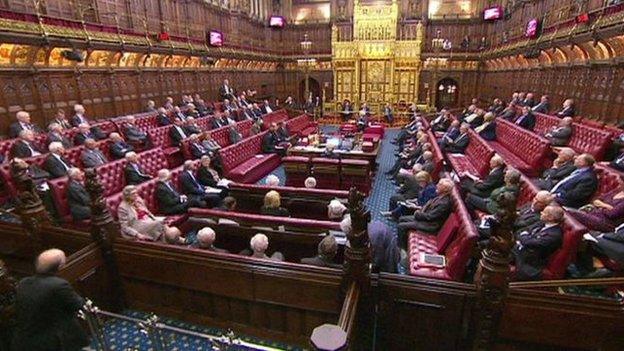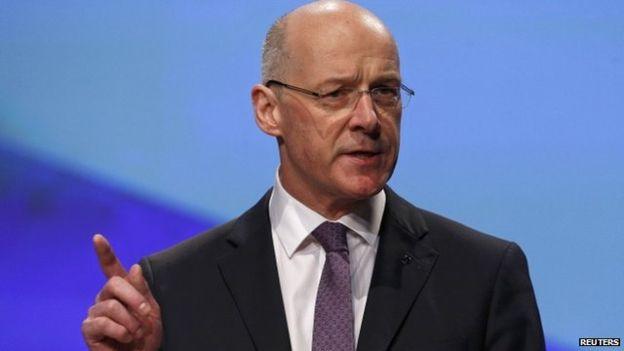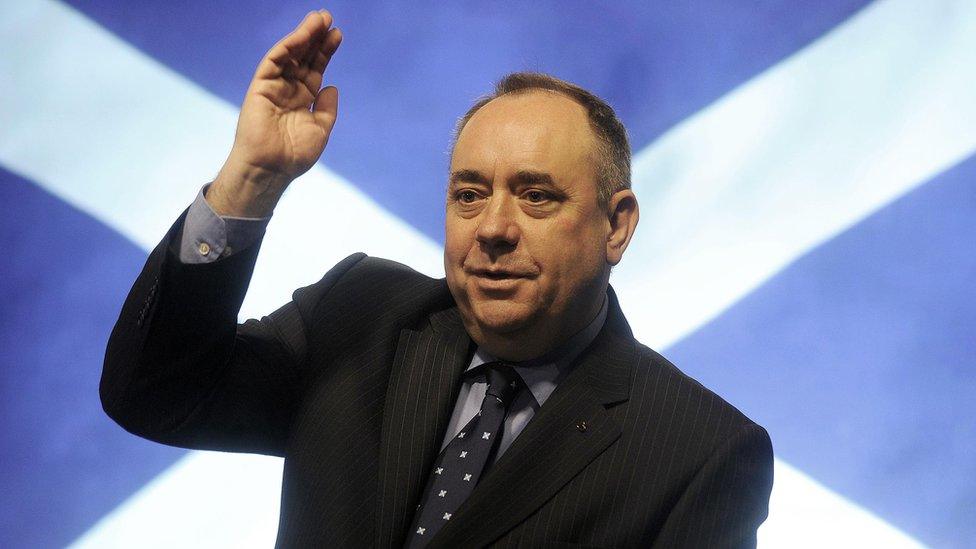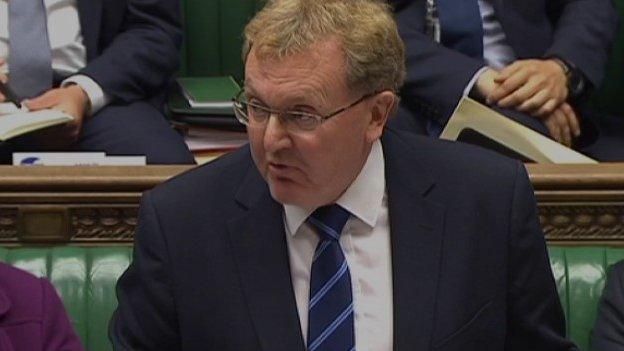Stumbling block for the Scotland Bill
- Published

Their noble Lordships are notably unhappy with the Scotland Bill. They want it put on hold until they get answers to a few minor matters. You know, wee things like the entirety of the Scottish budget for the foreseeable future.
So will there be a delay to the implementation of the bill? Yes, but perhaps not directly as a consequence of their Lordships' warning.
Rather, the problem is that the accompanying Fiscal Framework - who funds what and how - is still lodged in discussions between the Scottish and UK governments. No deal on money, no finality for the bill.
Specifically, the Scottish Parliament will not sign off on the Scotland Bill until John Swinney says he is happy with the accompanying cash package. And, right now, he is - like their Lordships - less than content.
But this is a Westminster bill. Why does it matter what Holyrood says? It matters because of the agreement that Holyrood has to signal consent before Westminster legislates on such issues.
To recap on what has happened. I expect the referendum of September 2014 is still fairly fresh in your minds. That was accompanied by a vow - sorry, Vow - from those who supported the Union that there would be new powers for Holyrood.
That begat the Smith Commission which generated a plan to devolve limited control of welfare plus control of income tax rates and bands to the Scottish Parliament. That begat the Scotland Bill.
Which, in turn, begat hard-argued discussion in the Commons. Close scrutiny in the Holyrood Committee, convened by Bruce Crawford. And, today, a report from the Lords Economic Affairs Committee, convened by Lord Hollick.

John Swinney wants a "fair" financial settlement
The Lords' report features prolonged argument as to why the bill - or, more precisely, the accompanying cash deal - won't do in its current state. But Lord Hollick cuts to the chase, as befits a former media tycoon. Their Lordships, he says, "haven't a clue" as to whether the bill is any good without seeing the full detail of the Fiscal Framework.
Broadly, John Swinney is of the same view. He too says he will not sanction the bill unless and until he receives what he calls a "fair" financial settlement for Scotland.
But Mr Swinney departs very sharply from Lord Hollick over another suggestion in the Lords report - which is that the Barnett Formula (which annually uprates the Scottish budget) should be scrapped and replaced by a needs-based review of expenditure.
A former (Conservative) secretary of state for Scotland once told me that every incoming Scottish secretary used to be presented with a request from the Treasury for a needs review. Every incoming Scottish secretary politely said: no dice.
Why so? Because Scottish secretaries and, now, first ministers fear that a needs review, if conducted by HM Treasury, with its well-merited reputation for parsimony, is scarcely calculated to end up helping Scotland.
To be clear, the UK government is also sticking to Barnett. It was a core part of the Smith Commission report that Barnett would stay - albeit generating a reduced block grant to match the new tax powers going to Holyrood.
Lord Dunlop, Scotland Office Minister, also told the BBC that he did not accept the Lords' argument that there was a fundamental need for a delay. The UK government, it seems, wants to get this settled.

And yet, as noted earlier, matters are not settled. The suspicion lingers at Holyrood that the Treasury wants to curb Scottish spending going forward, using new powers as a cloak.
This is adamantly denied by the UK government who say they will adhere to the principle that neither government should lose out solely as a consequence of the devolution of new powers.
The future is another place. If the Scottish economy thrives, the expectation is that the Scottish government reaps enhanced revenue. And if it slumps? Yes, you're ahead of me there.
The problem has been elegantly expressed by the thoughtful Prof Anton Muscatelli, Principal of Glasgow University and a renowned economist.
Prof Muscatelli reminds us that the problem does not lie with the first year, when the new tax powers kick in. The challenge is to find a way of indexing future adjustments to the block grant without disadvantaging Scotland overmuch - or indeed the UK government.
The talks between Edinburgh and London cover a range of areas. Block grant adjustment; capital borrowing; revenue borrowing; admin costs; and fiscal scrutiny.
But the big stumbling block is future indexation. Negotiation over that will undoubtedly now extend into the New Year. Which means no deal on the bill until then.
And the outcome? Lord Hollick would say that, right now, we "haven't a clue". And I am not here to say that he is wrong.
However, it seems possible to me that both the Treasury and the Scottish government will regard the prize of a devolved settlement as ultimately worth the price of compromise. But not, as John Swinney would remind us, at any price.
- Published20 November 2015

- Published9 November 2015

- Published8 November 2015

- Published2 November 2015
